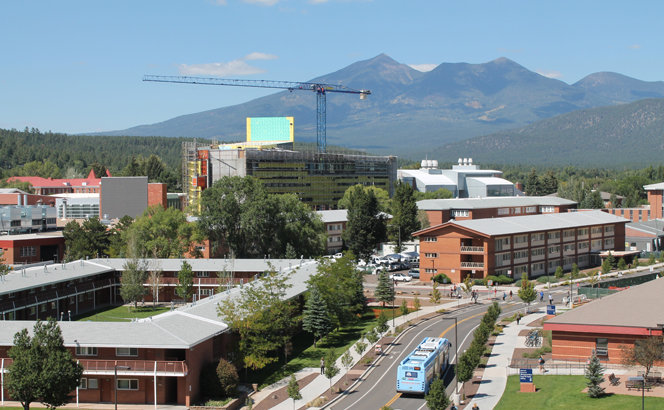Opportunities, challenges and lessons learned from her first five weeks permeated the presentation given by NAU President Rita Cheng when she welcomed the Arizona Board of Regents to Flagstaff this week.
“I see reasons to be optimistic, even proud, just as I see many areas that may call for some attention sooner than later,” said Cheng, who described the university’s progress as an upward trajectory.
Themes that emerged from Cheng’s presentation were NAU’s traditions and innovation. “What we do well – in undergraduate education, in focused research, in outreach to underrepresented students – we have consistently done well for a long time.” She reiterated the university’s continued path on the leading edge of biotechnology and in online adaptive learning, as well as in public-private partnerships.
The board reviewed progress toward goals for each of the three universities and 32 metrics identified as key measures in the Enterprise Plan. Many of the metrics are on target to meet 2020 goals including overall enrollment, community college transfers and total bachelor’s degrees awarded. The report tied freshman retention rates to strengthening the six-year graduation rate, two challenge areas Cheng discussed in her presentation.
“We are taking full advantage of the opportunity to be creative in retaining these students through graduation while emphasizing the quality of their experience,” Cheng said. “We welcome the insights provided by the metrics, and we will not shy away from understanding where we are and establishing where we need to go.”
Regent Greg Patterson commended NAU for its multifaceted approach to student support, including partnering with community colleges to build student skills and help prepare them for rigorous university coursework. He said “NAU has done extremely well” at identifying students who can benefit from taking courses through the 2NAU program, sharpening skills in math and chemistry courses at a community college while still having access to support services at the university and staying on track to a bachelor’s degree.
The board approved the university budgets for 2014-15 to submit to the governor and Legislature, which included a request for a third year of performance funding for all three universities. If approved, NAU will earn a total of $14 million, while Arizona State University stands to gain $38.3 million and the University of Arizona $14.5 million. The proposal responds to the state requirement for budget requests to include metrics on student hours completed, a focus designed to keep students on track toward graduation, and incentives for awarding high-demand degrees.
Regent Rick Myers agreed with suggestions for the performance-funding model and said the state also should provide financial aid for more students, a move that could provide greater accessibility to a college education.
Myers also praised NAU’s student safety report, calling it “not just another exercise but seriously good work.” Cynthia Anderson, director of Residence Life, presented the Student Safety Task Force recommendations, which listed inter-agency agreements, on-campus mental health support services, changes for fraternity and sororities, and the university’s numerous alcohol-education initiatives.
Former NAU President John Haeger was presented with the Regents Medal and designated with “President Emeritus” status. Chairman Mark Killian recapped highlights from Haeger’s 13-year presidency, noting Haeger is one of only a dozen individuals who have earned the honor since it was established in 1965. Haeger accepted the award and designation amid applause and a standing ovation.
NAU’s capital improvement plan received approval to complete upgrades to fire safety and accessibility in academic facilities on the Flagstaff campus. The plan includes the second phase of a multiyear effort to identify efficiencies and improve campus energy services.
Each university presented reports on use of TRIF, or technology, research and innovation funds, a voter-approved funding allocated from Arizona taxes to further university research and innovations. William Grabe, vice president for Research, said NAU has made some significant investments in health, environmental and climate science initiatives, in addition to strategically hiring researchers.
The regents will meet again Nov. 20-21 at Arizona State University in Tempe.



